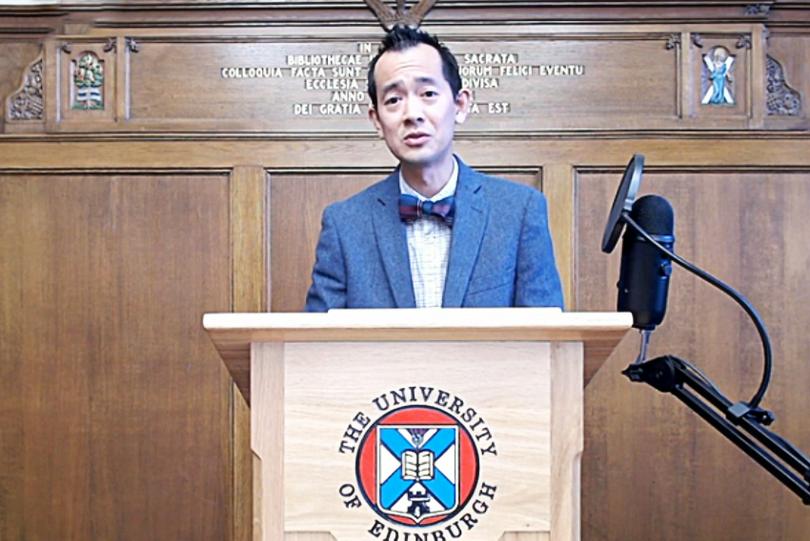A professor said Christianity had been translated into digital culture and the digital shift created new possibilities for mission and evangelism beyond the limits of space.
Alexander Chow, co-director of the Centre for the Study of World Christianity of the University of Edinburgh and editor of the Chinese Christianities Series, delivered an opening keynote titled “What Does Jerusalem Have to Do With the Internet?” at the annual meeting of the Yale-Edinburgh Group on World Christianity and the History of Mission on June 22.
The three-day conference featured the theme of “Oral, Print, and Digital Cultures in World Christianity and the History of Mission”.
In his keynote address, Dr. Chow introduced the concept of digitalization as a culture and illustrated different ways Christianity had been translated into digital culture. He argued that digital engagements of Christianity transformed the digital space into a “divine space”, which offered new modes for people to experience, perceive and practice the Christian religion.
Dr. Chow started by introducing the “digital culture” which was formed in the past decades by the use of digital technologies. Just as digital technologies, for example, track-and-trace apps, have become key tools in maintaining public health measures, they have also formed an important part of the daily Christian life, such as online services and Bible apps. As a culture, he argued that the digital “reconfigures Christian movement and networks from geographic spaces to digital spaces, translates the Christian message into a new medium, [and] changes the ways people experience and perceive and practice the Christian religion.”
Zooming in to the ways digital culture interacts with Christianity within other cultures of this world, the Chinese American scholar explained how digital culture and technology might accentuate individualism in one way and promote collectivism and group cohesion in another. A digital Bible on a mobile phone no longer shared the same nature as a public symbol of Christianity with paper Bibles, and the public expression of faith had been shifting from holding a physical Bible to sharing Bible verses on social media. On the other hand, Dr. Chow referred to a study of a Singapore church that used social media to highlight aspects of church cohesion, by encouraging members to take group selfies, called “wefie” or “usie”. The researcher noted that “these allocentric representations highlight the underlying Asian cultural collectivist values that are translated into digital culture.”
Digital technology’s very nature of interconnectivity naturally facilitated the global movement of Christianity, “a hallmark of World Christianity”, commented Dr. Chow. “Digital technologies have been used by diasporic Christians to send and receive prayers, blessings, and inspirational messages with those in their home countries and home churches, or by migrant workers in restrictive countries who otherwise would not have been able to attend worship services or mass if it were not conducted online.”
Ideas like “Chinese Christianity” should be now understood not just by geographic locales, but in transnational terms.
As churches saw an increasing number of geographically dispersed or international viewers in their online services, they started to be aware that the “digital shift creates new possibilities for mission and evangelism beyond the limits of space.” Dr. Chow further discussed contexts in which digital is seen not only as a tool but as a space, giving examples from African Pentecostal churches and China’s Reformed churches.
Within the contemporary African Pentecostal movement, according to research cited by Chow, there had been a belief that digital media was more than an instrument for evangelization or mission, but a space that could be dominated or occupied.
“It is a digital arena of spiritual warfare, in which God’s presence can sanitize and diffuse the influence of Satan, and Christians can take authority, in Christ, to dominate and influence.”
He then examined the case of Chinese reformed Christians’ “cat-and-mouse chase” under the very restrictive internet censorship.
“Reformed Christians in China have negotiated this restrictive digital space through online magazines, blogs, and microblogs to promote theological rationale for the change in the society and the state, testing and challenging the digital boundaries for public discourse.” He said, “While the Chinese government has developed legal frameworks to exert what it calls ‘Cyberspace Sovereignty’, these Reformed Christians would likely argue that Divine Sovereignty has ultimate control over the digital space.”
He concluded the address by reminding Christians of some challenges that remain in the digital culture. Digital technologies, despite their ability to allow the weak and powerless to speak, could also accentuate hierarchies of resourcing, creating gaps between the “digital rich and digital poor”. The rapid development of computer chips and hardware could also bring huge ecological costs to the creation of which humans are called to be stewards.












